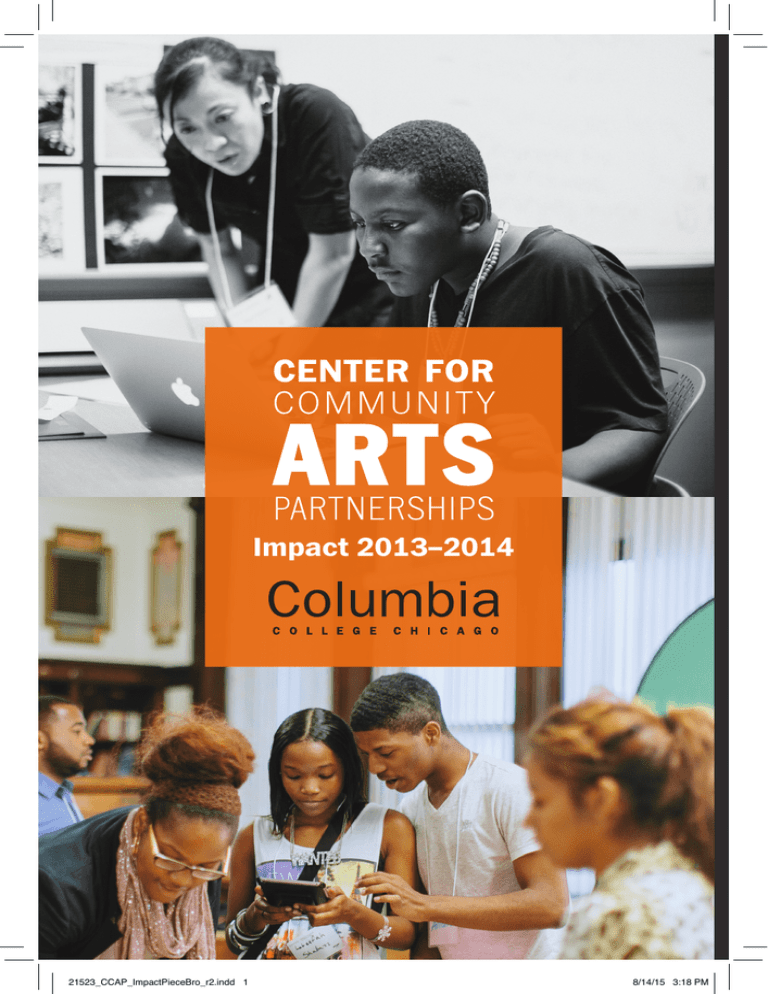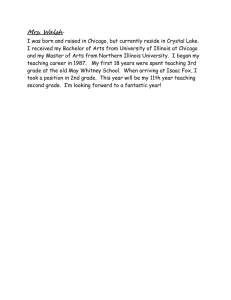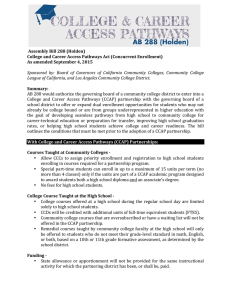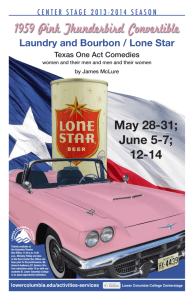Impact 2013–2014 21523_CCAP_ImpactPieceBro_r2.indd 1 8/14/15 3:18 PM
advertisement

Impact 2013–2014 21523_CCAP_ImpactPieceBro_r2.indd 1 8/14/15 3:18 PM Columbia College Chicago’s strategic plan, developed in 2014-2015, lists Community Engagement as one of six focus areas, stating: “We will be known as an animating force in our communities, in the city of Chicago, and in the larger world beyond.” In fact, the College’s continued commitment to community engagement “will encompass a wide range of reciprocal partnerships that help to sustain diverse forms of socially engaged creative practice, scholarship, advocacy, and activism.” This report spotlights the impact of CCAP’s work in 2013–2014. We hope that the numbers (pulled from program evaluations) and stories (of a diverse range of participants) paint a compelling picture of the breadth and depth of CCAP’s impact as an animating force through our partnerships with the city, schools, and community-based organizations. 21523_CCAP_ImpactPieceBro_r2.indd 2 8/14/15 3:19 PM CCAP Partners 2013–2014 In 2013–2014, CCAP worked with 79 partner organizations: 43 public schools and 55 communitybased organizations, as well as 30 departments and units at Columbia College Chicago. Organizations Schools About Face Theatre; Access Living; Alternatives; Avalon Park Elementary School (ES); Burley Archi-Treasures; Art Schools Network; Arts ES; Calmeca Academy of Fine Arts and Dual Alliance Illinois; Association House of Chicago; Language; Chicago High School for the Arts; Auditorium Theatre; Chicago Arts Partnerships Chute Middle School; Claremont Academy; in Education; Chicago Children's Choir; Chicago Crown Community Academy of Fine Arts; Dawes Commons; Chicago Park District; Chicago Public ES; Dixon ES; Dr. Bessie Rhodes Magnet School; Art Group; Chicago Youth Centers; Chicago Youth Foreman High School (HS); Gillespie ES; Gray ES; Voices Network; Common Sense Media; DePaul Haines ES; Haven Middle School; Herzl School University; E.A.T. Chicago; ElevArte Community of Excellence; Juarez Community Academy Studio; Englewood Community Cultural Planning HS; Kellman Community Academy; King Arts Council; Ensemble Español; Free Spirit Media; Free Magnet School; Kipling ES; Lake View HS; Lenart Street Theater; FUSE; Gary Comer Youth Center; Elementary Regional Gifted Center; Lincoln Park Hive Chicago; Hubbard Street Dance Company; HS; Lindblom Math & Science Academy; Mahalia Illinois Campus Compact; Illinois Federation for Jackson ES; McCutcheon ES; Morgan Park HS; Community Schools; Ingenuity, Inc.; Kuumba Lynx; Morrill Math & Science School; New Sullivan ES; Latinos Progresando; Little Black Pearl Workshop; Nichols Middle School; North Lawndale College Matli Dance Academy; Marwen; Najwa Dance Preparatory HS; Oakton ES; Perez ES; Pulaski Corps; National Coalition for Community Schools; International School of Chicago; Ruiz ES; Sabin National Guild for Community Arts Education; Magnet School; Schurz HS; Solorio Academy HS; National Performance Network; News Literacy Sullivan HS; Tilden Career Community Academy; Project; People's Music School; Plug-In Studio; Walker ES; Washington ES; and Wentworth ES. Puerto Rican Arts Alliance; Redmoon Theater; Snow City Arts; Storycatchers Theatre; Street- Columbia Departments, Offices, & Centers Level Youth Media; The Peoples Cook; TrueStar; Advertising & Public Relations; Art & Activism; University of Illinois at Chicago; Urban Gateways; Art + Design; Audio Arts & Acoustics; Business Yollocalli Arts Reach; and Young Chicago Authors. & Entrepreneurship; Cinema Art + Science; College Advising; Creative Writing; Dance Center; Dance; English; Fashion Studies; FirstYear Seminar; Humanities, History, & Social Sciences; Interactive Arts & Media; Journalism; Learning Studio; Library; Multicultural Affairs; Music; Photography; Portfolio Center; Radio; Science and Mathematics; Student Employment; Television; Theatre; Undergraduate Admissions; Center for Innovation in Teaching Excellence (CITE); and Sherwood Community Music School. 1 21523_CCAP_ImpactPieceBro_r2.indd 3 8/14/15 3:19 PM Funders & Supporters 2013–2014 CCAP Staff 2013–2014 U.S. Department of Education Investing in David A. Flatley, Executive Director Innovation Fund and the Arts-in-Education Model Rachel Bailey Development and Dissemination grant program; Courtney Bell the Illinois Arts Council Agency; the Illinois Toni Campbell State Board of Education; Chicago Park District; Katie Collins Chicago Public Schools; Evanston/Skokie District Margaret Conway 65; Adobe Foundation; Archeworks; Bretford; Rachel Culich Burberry Foundation; the Crown Family; Evanston Mindy Faber Community Foundation; FLOR; Food 4 Less Aaron Golding Foundation; Lloyd A. Fry Foundation; Maurice R. Heather Heslup and Meta G. Gross Foundation; Leo S. Guthman Joe Hulbert Fund; the William Randolph Hearst Foundation; April Langworthy Hive Chicago Fund for Connected Learning; JeeYeun Lee JPMorgan Chase Foundation; Kinder Morgan Maurya Orr Foundation; Lego Education; Little Bits; Louis Sean Owens Armstrong Educational Foundation; John D. and Lynne Pace Green Catherine T. MacArthur Foundation; McCormick Christin Quaye Foundation; Colonel Stanley R. McNeil Foundation; Liz Parrott Radzicki National Performance Network; Pearson; Polk Kim Richards Bros. Foundation; Shure; TG; TOMS®; Turnstone/ Alyssa Sorresso Steelcase®; United Way of Metropolitan Chicago; Paul Teruel U.S. Bank Foundation; Walton Family Foundation; Kathleen Tieri Ton and the Farny R. Wurlitzer Foundation. Jacob Watson Leslie Woods For More Information Center for Community Arts Partnerships Columbia College Chicago 600 S. Michigan Avenue Chicago, IL 60605 (312) 369-8850 ccapinfo@colum.edu colum.edu/ccap Photography by Jacob Boll (’12) 21523_CCAP_ImpactPieceBro_r2.indd 3 8/14/15 3:19 PM The Center for Community Arts Partnerships (CCAP) was founded in 1998 at Columbia College Chicago. CCAP is committed to transforming lives through the arts. To fulfill this mission, CCAP develops programs that expand learning, connect Columbia College Chicago to schools and communities, and build a new generation of engaged artists. CCAP exemplifies Columbia College Chicago’s commitment to community engagement by building deep, reciprocal partnerships with schools and community-based organizations across the Chicago metropolitan area. These partnerships engage Columbia College Chicago students and faculty in real-world experiential learning and applied research, while also extending the learning environment to community members. Facing both inward and outward, CCAP works with three focus areas and audiences 1. Columbia College Chicago students and faculty; 2. The teaching artist* field; 3. The community. 21523_CCAP_ImpactPieceBro_r2.indd 4 Each year, CCAP works with over 750 Columbia College Chicago students, 50 Columbia College Chicago faculty members, 5,000 children and youth, 600 parents of public school students, 200 classroom teachers, 30 staff members of community-based organizations, and 150 teaching artists in partnerships with over 40 public schools and 50 communitybased organizations. *“A teaching artist is a practicing professional artist with the complementary skills, curiosities and sensibilities of an educator, who can effectively engage a wide variety of people in learning experiences in, through, and about the arts.” —Eric Booth 8/14/15 3:19 PM Columbia College Chicago Students and Faculty Columbia students report that their experiences with CCAP are different from other learning opportunities at the College. Many students indicate that their participation in CCAP programs and communityfocused work has led to a deeper understanding of themselves and their personal values. Columbia faculty members report that their teaching, research, and creative practices are deepened and inspired by their CCAPsponsored engagement in the community. CCAP works with Columbia students, faculty and administration to increase the college’s community engagement and facilitate students’ capacity to “author the culture of their times,” a central tenet of Columbia’s mission. Coursework, internships/practica, volunteering, and part-time employment deepen students’ understanding of civic engagement in the 21st century, while providing heightened skills and experience, mentors, and portfolio contents that they can use as they begin their careers. CCAP additionally helps faculty incorporate meaningful community engagement into their curricula, research, and creative practice. Opportunities for Columbia students and faculty through CCAP include: Urban Missions CCAP’s founding program nurtures a network of Chicago community-based organizations and Columbia academic departments and centers. Each semester, College faculty members collaborate with organizations to create handson learning courses as well as arts projects in the community. Internships and Employment CCAP places Columbia students in schools and community-based organizations as interns, program assistants, teaching artist assistants, tutors, and mentors, to help them gain professional skills and experience in nonprofit arts and youth development sectors. 5 21523_CCAP_ImpactPieceBro_r2.indd 5 8/14/15 3:19 PM Impact on Columbia Students 2013–2014 Increased Student Retention Columbia students who persisted into their second year. BIGArt In partnership with the Office of New Student Programs, CCAP helps first-year Columbia students learn about Chicago communities and issues by volunteering in a public school or community-based organization to teach art to children and youth. BIGArt Fellows This special initiative in 2013–2014 brought together a cohort of first-year African American, Latino, and first-generation college students in a year-long project to mentor North Lawndale middle school students. This enhanced college readiness for the mentees while creating an opportunity for Columbia students to interact with the community during their critical first year in college. Teaching Artists CCAP actively solicits Columbia full-time and adjunct faculty to extend their practice in K–12 schools and other community settings as teaching artists, coaches, and mentors in arts integration, connected learning, and after school arts (see next section). Faculty Fellows In collaboration with other Columbia departments, CCAP offers Columbia faculty members the opportunity to extend their pedagogy, research, and creative practice through fellowships exploring service-learning, digital media, and connected learning. 74% 71% 62% BIGArt Fellows Students All Columbia First-Year Students Comparable peer group (other first-year Pell-eligible African American and Latino students) Increased Career Skills and Community Engagement 91+9+L 89+11+L 81+190+L 100+L 91% Columbia students in Urban Missions programs who agreed that the program increased their opportunities for technical and professional development. 89% Columbia students in the BIGArt Fellows program who agreed that participation enhanced skills relevant to their career goals. 81% Columbia students in Urban Missions programs who agreed that their participation increased their exposure, understanding, and commitment to Chicago’s communities. 100% 21523_CCAP_ImpactPieceBro_r2.indd 6 Columbia faculty members in Urban Missions who agreed that the partnership increased their ability to meaningfully incorporate community engagement into pedagogy and curricula. 6 8/14/15 3:19 PM Columbia Student Donavahn Frierson Donavahn Frierson, Graphic Design major, entered Columbia College Chicago with a love of working with children and experience with numerous community projects. CCAP’s BIGArt J-term course was a perfect fit for his interests. The course not only provided theory about pedagogy and child development, but also allowed him to work directly with children by assisting teaching artists in CCAP partner schools. “We did a lot of studying and research and talks and we experimented a lot, but then we actually got put in the battlefield,” he said. The course also gave Donavahn the chance to explore different Chicago neighborhoods. The experience opened his eyes to gentrification, drove home the importance of community, and provided new revelations about the value of relationships and open-mindedness. Working in the classroom also helped Donavahn improve his organization and communication skills. He put those skills to work his sophomore year, when he was hired as an after-school CCAP Teaching Assistant and Tutor at Pulaski International School of Chicago, one of the schools he visited during the BIGArt course. Over time he has become more comfortable and effective, not just with the students but with the teaching artists who run the after-school classes: “I’ve gone from assistant to coworker to friend.” He now spends his time interacting directly with students in the classroom, instead of mostly observing as he did at the beginning of his placement. Overall, Donavahn says it has been rewarding to go back to the school, serve where needed, and learn along the way. “That’s what made me stick with CCAP so long—I actually got to be in action.” 7 21523_CCAP_ImpactPieceBro_r2.indd 7 8/14/15 3:19 PM 8 21523_CCAP_ImpactPieceBro_r2.indd 8 8/14/15 3:19 PM




